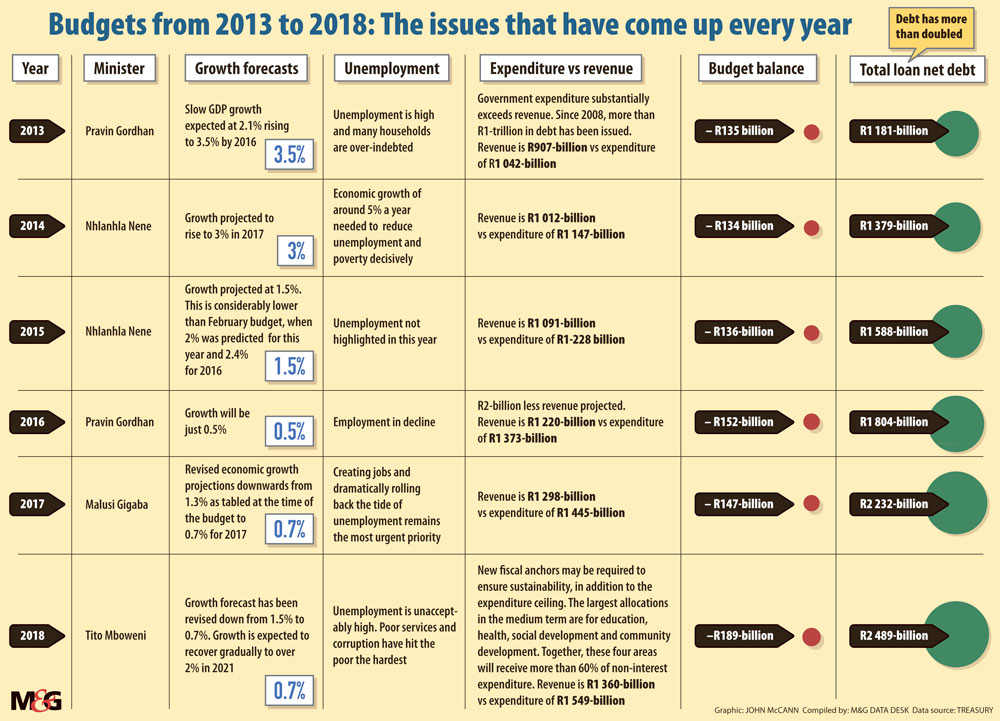(Graphic: John McCann/M&G)
Despite a deteriorating budget outlook, Wednesday’s medium-term budget policy statement (MTBPS) granted almost R10-billion more for struggling state-owned entities (SOEs).
But, said Finance Minister Tito Mboweni said in a press conference, the money for the likes of embattled SAA did not make the airline a “holy cow”.
Although he laid the groundwork for what could be major changes to the government’s parastatal portfolio, emphasising the need to “reconfigure” SOEs, he stopped short of announcing the sale of noncore assets to bolster the government’s finances.
“There is a lot contained in that terminology of reconfiguration,” Mboweni said. “It means among others that we should be open-minded about inviting either equity partners or be open to closure of some business activities.”
Perennially troubled SAA received a R5-billion injection, an additional R1.2-billion was granted to South African Express Airways and an extra R2.9-billion was found for the South African Post Office.
The department of public enterprises under Pravin Gordhan was grappling with the difficulties facing several SOEs but, Mboweni added, “if we need to close [the airline] down we should”.
The working class did not travel on SAA, he added. “You are better off making sure your trains, which are used by the working class, work properly, and that the Rea Vaya [bus system] works properly.”
The extra provisions for SOEs also include R5.8-billion for the South African National Roads Agency (Sanral), which is not generating sufficient income from the Gauteng freeway improvement project to settle redemptions on its debt, which risked a call on its state guarantee, according to the treasury.
The additional money being set aside for SAA is to help it to repay some of its debt, but it has strings attached. According to a special appropriation Bill, tabled before Parliament with the MTBPS, the finance ministry must impose written conditions on SAA before any part of the money is transferred. Parliament must also stop any funding if these conditions are not met and SAA must transparently disclose any such action to the standing committee on finance in the National Assembly and the select committee on finance in the National Council of Provinces. According to treasury director general Dondo Mogajane, the conditions will encourage performance-based management. For example, the R400-million in savings the airline has made in the short term must be replicated, he said.

But discussions were continuing with the department of public enterprises, which would receive the money on behalf of SAA, he said. The department would have to study the government’s aviation strategy and “consolidate [and] close where possible. We want to see a plan,” Mogajane said.
Other major SOEs such as Eskom did not receive additional funding, but they still remained a risk the government finances, according to a fiscal risk statement published with the MTBPS.
In 2016-2017, the most recently available figures, the combined liabilities of national public entities and state-owned companies totalled R1.6-trillion. The interest-bearing debt of the 10 state-owned companies that borrow the most had grown to R702.7-billion in 2016-2017, an increase of 163% in seven years.
“Although the increase in debt has largely financed capital expenditure, a growing proportion of debt is now financing operations and interest payments,” according to the risk statement.
Meanwhile, the debt redemptions of those companies were expected to average R66-billion from 2019-2020 to 2021-2022, which is more than government’s own debt redemptions over the same period.
The state-owned companies might also have to refinance debt at higher interest rates, “causing further reductions in profitability and net operational cash, which could in turn affect their ability to service future obligations”.
The companies unable to refinance this debt “face the prospect of immediate repayments, which may require them to sell assets or otherwise decrease their operating costs”, the statement warned.
The labour movement has been critical of any discussions by the state about privatising parastatal assets or retrenching workers.
But, Mboweni said, these discussions needed to be approached with an “open mind”, even though he was likely to criticised for harbouring “wrong notions of investment bankers”.
“But you have to be open-minded and really you have to progress in your thinking towards the wi-fi generation, otherwise you are stuck in the Fifties,” he said.
These conversations would have to result in practical actions, which “the market … will respond to positively”, he added.